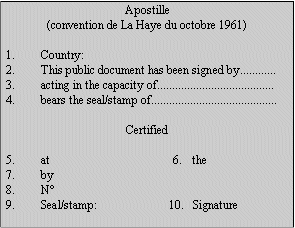As an international student intending to start a degree program at the PLUS, you need to submit an application for admission. The processing of your application can take up to a few months, so please make sure to apply as early as possible. Each application process depends on different factors, such as nationality, previous education, and quality of the application documents.
-
Legalization and Translation
Generally, all submitted foreign documents, including submitted certificates and confirmations, have to be legalized at the country of origin according to the regulations in effect. Additionally, a verification of the legalization is done by the local Austrian embassy/consulate. The legalisation is a confirmation of authenticity of each signature and stamp on the document. Therefore, documents have to be legalized at all times, even when presented in their original hard-copy version. An exemption is made for documents from countries who signed a treaty to abolish the legalization.
There are several treaties signed by Austria in effect with other states defining the legalization of documents. According to these treaties, there are three different categories of legalization:
Category 1: Legalization with the Hague Apostille
If the country of origin is a member of the Hague Convention, documents are legalized with the Hague Apostille. The Apostille is issued by the respective internal offices. The respective consulate or embassy can answer queries on membership.
An overview of participating countries is presented here: Hague Apostille – responsible offices
According to Art. 4 of this convention, the Apostille is to be attached directly to the document or to an attachment thereof.
Sample:
Category 2: No legalization required due to intergovernmental treaties
Certificates from the following countries do not require a legalization, if they have been submitted in their original hard-copy version (bearing stamps and official seals): Belgium, Bosnia and Herzegovina, Bulgaria, Croatia, Czech Republic, Finland, France, Germany, Hungary, Italy, Liechtenstein, Montenegro, North Macedonia, Netherlands, Norway, Poland, Romania, Sweden, Serbia, Slovakia, Slovenia.
Category 3: Full Diplomatic Legalization (Ministry of Foreign Affairs and Austrian Embassy/Consulate)
This form of legalization is required for documents issued in countries who are not part of any treaty. Documents are legalized according to the domestic regulations (mostly ending with the legalization by the respective Ministry of Foreign Affairs) in a first step. This legalization is then verified by the Austrian Embassy/Consulate responsible for the country of origin. Note: The order of legalization must not be changed.
-
Translation
Documents written in a foreign language (not German) have to be translated by a sworn translator into German. The only exception to this case is English documents – they do not have to be translated.
Seals, Stamps and legalizations also have to be translated! Additionally, the translator’s signature has to be verified. Translations written by Austrian sworn translators do not have to be verified. Translations have to be attached to the original verified documents and may not be separated. -
Language Proficiency
For study programs taught in English
Prospective students applying for an English-taught study program have to prove their language proficiency by submitting an accredited language certificate. A list of all accepted language certificates can be found here. Alternatively, if language proficiency of C1 or higher is confirmed in the secondary school certificate, the certificate is accepted as proof.
Details on accepted language certificates can be found here
For study programs taught in German
According to §63, sect.10 University Law 2002, prospective students whose first language is not German have to prove their language proficiency by submitting an accredited language certificate. Alternatively, if language proficiency of B2 or higher is confirmed in the secondary school certificate, the certificate is accepted as proof.
If no proof of the required language proficiency in German is submitted, an additional exam has to be taken according to §63, sect. 10a University law 2002. The exam is taken as part of the language course offered as preparation (Vorstudienlehrgang VPLUS). In order to sit the exam and take part in the course, you have to submit an application for admission at the PLUS along with a minimum German certificate of B1.
Details on accepted language certificates can be found here.
Prospective students in possession of a letter of admission are entitled to a place at the VPLUS language preparatory course. Details on the course at the Paris Lodron University of Salzburg are presented on the homepage of the course centre.
NOTE: The participation in the VPLUS course is a requirement for the application for the student’s visa (“Aufenthaltstitel Studierender”). Information on the visa and residence permit is given by the responsible office: Magistrat Salzburg – Amt für öffentliche Ordnung.
Contact:
Magistrat Salzburg – Amt für öffentliche Ordnung
Schwarzstraße 44
5020 Salzburg
-
good to know





